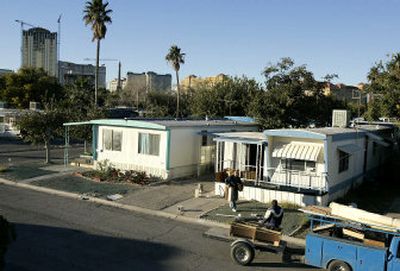Mobile home owners feeling development pinch

LAS VEGAS – Wading nearly knee-deep in the mattresses, sooted clothing and discarded tires dumped outside his trailer, Rubin Reams wants visitors to know he hasn’t always lived this way. The 51-year-old poker dealer never had much of a financial cushion. But he worked full time and steadily, and owned a 40-foot double tip-out trailer he happily called home.
Then the mobile home park he lived in was sold to a developer, and the rug – like the land – was pulled out from under him.
Reams is caught in a trend sweeping real estate markets where land prices and development are booming. Park owners are increasingly selling out for massive profits to developers who covet the land for posh condominiums, strip malls and office parks.
In the Las Vegas area, where the cost of an undeveloped acre has risen more than 80 percent in a year, 14 mobile home parks have closed or announced plans to close this year alone. That’s more than the seven previous years combined.
Experts say the pattern is being repeated in pockets across the nation, particularly in Sun Belt and Pacific Northwest states.
Arizona has seen 30 parks close in the past two years, many in the path of Phoenix’s eastern sprawl. Washington’s mobile homeowners association estimates the state has lost 500 mobile home spaces in the past 6 months. Florida is losing 5,000 to 10,000 mobile home spaces a year, according to industry estimates.
Many of the park owners who sell are mom-and-pop operators who have put off repairs and upgrades for years, can’t accommodate newer, larger manufactured homes and charge little for rent. At the same time, corporations are opening bigger manufactured housing communities often filled with pricey high-end homes.
“These parks that are closing tend to be filled with older, small homes. Those homes are far more than affordable, they’re cheap. It’s for people who can’t afford any other kind of housing,” said George Allen, a mobile home park owner and real estate management consultant who writes an industry newsletter.
In Las Vegas, a city once known as an oasis of low-cost living, the median price of existing homes has reached $280,000, while the median household income hovers at about $49,300, according to Applied Analysis, a local research firm. Nurses, teachers, senior citizens and casino workers like Reams are increasingly finding it hard to buy into the market.
For many of these people, mobile homes and trailer-park living are a viable and attractive alternative, said Renee Diamond, head of the Nevada Division of Manufactured Housing. On the low end of the rental scale, homeowners like Reams can buy a trailer for several hundred dollars and pay $320 a month in rent. Slots in newer communities rent for about $550 a month.
“I’d just rather have something that was mine,” said 39-year-old Shawn Kirby, a former resident of the now shuttered Tropicana Mobile Home park just off the Las Vegas Strip.
When the Tropicana sold to a Florida developer, Kirby and other residents were faced with two options: Let the owners pay for the move to another park or take a lump sum payout of the market value of their mobile homes. Kirby, like many Tropicana residents, took the payout – which at $3,700 dollars, was four times his monthly disability check.
Days after the deadline for relocation, Kirby was back at the eerie ghost town of abandoned trailers at the Tropicana looking for work helping the few lingering residents pack up and move. Several residents were still squatting in empty trailers without electricity or water. Scavengers picked through empty homes.
The process of uprooting a neighborhood is never pleasant or problem-free, said Marolyn Mann, executive director of the Nevada Manufactured Home Community Owners, a park owners group. Mann noted that Nevada law requires owners to give six months notice to residents and follow strict procedures for removing or buying the homes. Many owners give more time and pay more than the law requires, but in the end, park owners have a right to sell their land, she said.
Nevada state officials say the law could be changed to benefit residents. Under current regulations, park owners are allowed to deduct the cost of the disposal of the home from the payout. That cost can often eat up the bulk of the payment, particularly for older mobile homes.
“In essence the homeowner can still end up getting zero,” said Allen Scott, an investigator at the Nevada Division of Manufactured Housing.
Government officials in other states are looking at ways to cushion the transition. Housing advocates in Arizona have pushed for “right of first refusal” laws that give residents the first shot at buying the land before it can sold.